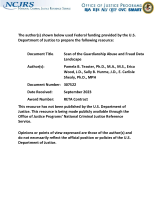Does variation across judicial circuits matter? Examining the role of bail schedules and pretrial detention on drug case outcomes in Florida
Journal
Journal of Criminal Justice
Date Published
July 2025
Agencies
NIJ-Sponsored
Publication Type
Research (Applied/Empirical)



